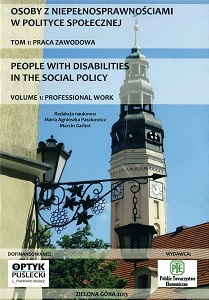
Professional work
Praca zawodowa
Keywords: people with disabilities; work; labour market
In the vast literature devoted to the issue of people with different sorts of disabilities and their functioning,pedagogical trend is dominant. There are relatively few publications that touch on issues connectedwith disability in a bigger picture – from the point of view of social policy, including the labourmarket. Marginalisation, integration, normalisation, equalisation of opportunities, barriers experiencedby the disabled have become the subject of theoretical deliberations and relatively broad empiricalresearch – especially since 2003 when the European Year of People with Disabilities was celebrated.Vocational preparation, rehabilitation and vocational activation as well as employment of these peoplewere discussed, among others, within the framework of series of conferences organised by PolishChamber of Commerce and Vocational Rehabilitation in Warsaw and the University of Zielona Góra("People with Disabilities on the Modern Labour Market", "Professiological Congress"). Similar topicsare touched on in magazines, including: "Social Policy", "Disability and Rehabilitation", "VocationalActivation of the Disabled", "Problems of Professiology", "Disability: Issue, Problems, Solutions".The first volume of the series "People with Disabilities in Social Policy" is out for readers. The presented publication enters current trends in the discussion concerning social policy towards the disabled, along with the undertaken actions that aim at social integration and activation of disabled people.Within the framework of the Polish academic thought there were successful attempts to organise the discourse of active social policy (e.g. the work of Marek Rymsza, Andrzej Barczyński, LucynaFrąckiewicz, Ryszard Szarfenberg). Deepened presentations may be found in the multidimensional output within the scope of methodology and standards of social policy in the spirit of activation approach- one of corpuses of this policy dedicated to people with disabilities (e.g. the work of Lucyna Frąckiewicz, Bożena Kołaczek, Julian Auleytner).
More...